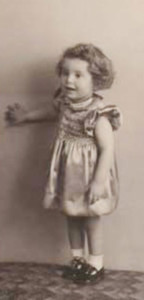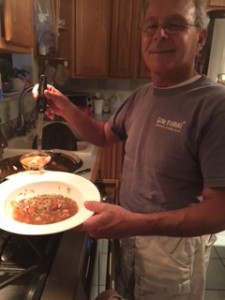Waste Not, Want Not

The author, as a young child in Scotland
When I was a wee lassie in Lanarkshire we were taught three things: Piety, Thrift, and Wheesht. (I remember “Wheesht” was sort of like “Hush” but with the authority of a Scottish Mum.) Oh, and Telling the Truth. That was definitely required. Roughly translated, piety meant that you went to the Kirk all day on the Sabbath; you got a shilling a week, and sixpence was supposed to go in the collection plate; you were expected to be seen and not heard. About the truth part … to tell you the truth, I never thought too highly of Piety, Thrift, and Wheesht. I thought it was an over-rated formula for raising weans. But that’s jist me, mind ye!
If you were brought up the same way, you may find it interesting to speculate on how many of those childhood messages still whirl and wheech around in your brain and influence your daily decisions.
I’d like to talk about the thrift myth. Caution and good sense should not be confused with lack of generosity. Yes! We made do, but we never really did without and there was always enough to share. What a great lesson that was. “Reduce, Reuse, Recycle,” the mantra of the environmentalist, just makes good sense.
The Co-op horse-drawn cart brought six pints of milk (and picked up the empty bottles) each morning. Old Monty, the Clydesdale horse, left his calling card, not just once in a while, but every single day for years. Good old Monty … probably got his moniker from Field Marshall Montgomery, a hero in our childhood. Every day there was a large mound of manure outside our gate.
I’ll never figure out how my father trained that horse. Dad went out with the shovel and brought that precious fertilizer into the back yard to nourish his rose garden. At one point I counted two hundred rose bushes out there. It was a spectacular display of colour. To this day the fragrance of roses brings back memories of my father, the crazy paving paths he built and myriad species of roses he planted that could lift your spirits even on a rainy day.
At the top of the garden the chicken coop was another recycling project. Table scraps were mixed into the hot hash my father prepared daily for the hens. To go out in the morning and filch an egg from under a squawking hen and boil it for your breakfast is to see the immediate and delicious benefits of “waste not, want not.”
In some aspects I have inherited the thrift gene.
When I take my iron kettle out of the cupboard, my husband knows soup made from homemade stock will soon be bubbling on the stove. There is never a pick left on a bone that leaves this house. Be it chicken, turkey or lamb, all the remaining skin and bones and pot “likker” are boiled up into a fragrant broth. People have laughed to see that old pot and the scraps that go into it. But they’ve never laughed at my soup.

Paul, my husband, helping himself to a second plate of chicken vegetable soup.
No paper is ever recycled from my office unless both sides of the page have been used.
What’s wrong with using a shopping bag to bring home the groceries? They’re washable, re-usable and carry a whole lot more than puny plastic bags or paper bags that rip. And they won’t clog up the landfill. Before brand names paid for our television programs, we chose our own “no-name” soaps, veggies, butter and cheese and all the rest. Newspaper separated the dirty potatoes from the other items in the big leather shopping bag.
In the doctor’s office the other day, I saw a familiar scene. She, a lady of Scottish extraction, had an almost empty bottle of soap in the bathroom draining into a new bottle to use up the last drop. I was impressed. If, like me, you live outside the boundaries of Scotland you may see eyebrows raised at the perfectly logical methods we use to save money, substance, and, incidentally, the environment. And why not? My husband laughs and thinks I go too far when he sees me saving a jar of jam because there is another spoonful in it. The last wee drop in the bottle is just a good as the first, be it soap or medicine or single malt whisky.
I’ve passed the thrift gene on to my daughter, who is an environmentalist and conservationist, and my grandson who is canny wi’ his bawbees. He is only half Scottish, but has a philosophy on spending money that would make his ancestors proud. After he learns the price of something he wants, he says indignantly, “I’m not wasting my money on that!” He knows, to the penny, the amount in his bank account and has no plans to spend any of it apparently. Then, he asks, “Will you buy it for me?”
Our reputation for thrift is worldwide. We are teased about it in jokes and stories and even on the internet, where I got this gem: When the ferry company in the Western Isles charged reduced rates for vehicles transporting sheep, some customers took advantage of this and took a sheep in the back seat of their car when going to the mainland (and had the same sheep on the way back). Eventually, the company had to change the rules.
A Few Jokes on the Subject of “Thrift.”
Then there’s the one about the two brothers who went into business together. At the end of the first year they tried to balance their account books, but were ten pounds short. They tried again and again, but no matter which way they tried to do it, they always came out ten pounds short. “Tell me the truth, Sandy,” asked his brother, “Are you keeping a woman on the side?”
Some stories about Scottish thrift go too far:
A Scottish sergeant major went into the chemist with a damaged condom and asked, “How much to fix this and how much for a new one?”
“Sixpence to fix it; a shilling for a new one,” he was told.
He came back the next day and told the chemist, “The regiment says, ‘Fix it.’”
